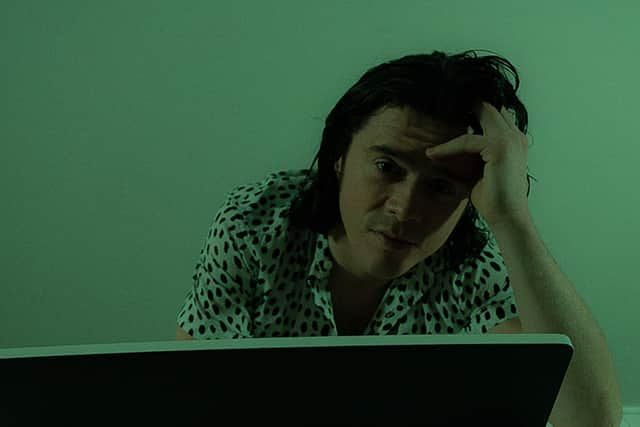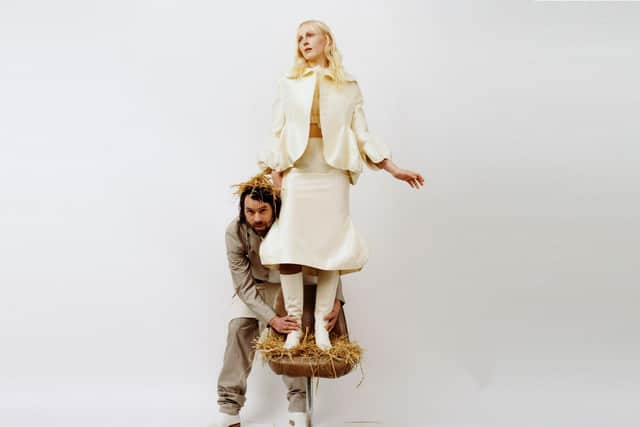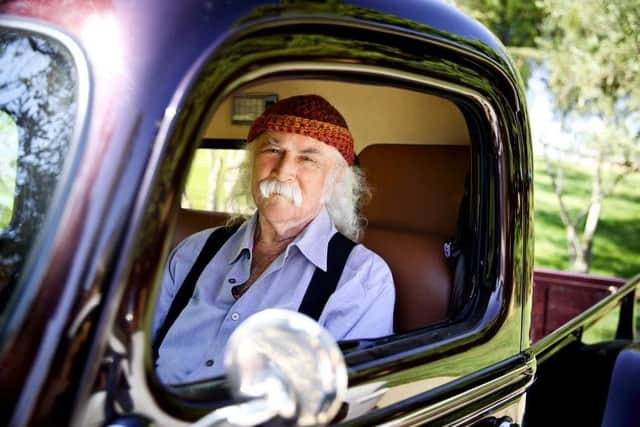Album reviews: Kyle Falconer | Lump | David Crosby | wojtek the bear


Kyle Falconer: No Love Songs for Laura (Honey Pie Records) ***
Lump: Animal (Partisan/Chrysalis) ****
David Crosby: For Free (BMG) ****


wojtek the bear: heaven by the back door (Last Night from Glasgow) ****
Advertisement
Hide AdAdvertisement
Hide AdKyle Falconer has packed in a fair few rock’n’roll clichés – from addiction to air rage to rehab in Thailand – in his 15 years as frontman of Dundonian indie heroes The View. Meanwhile, his pop chops, including his innate tunefulness, vocal skills and love of stage musicals, have often been overlooked.
His solo career is an opportunity to reset perceptions and flex his melodic muscles. His second solo album, No Love Songs for Laura, created with producer Frankie Siragusa, takes him far from traditional View territory, swapping guitar for piano as his writing instrument and embracing a host of retro stylistic influences alongside the radio-friendly tropes of the day to fashion the catchy propulsive pop of Stress Ball and 21st century soul funk earworm of Wait Around.
Along the way, there are simple, candid reflections on rehab, odes to his wife and his late mother, a humble acceptance of his flaws and even his domestic responsibilities (“I’ll stay at home, and mind the kids and sing the songs”) on the lighter-waving Rake It In.


The timeless indie pop of Moan is his sole concession to his rocker past; otherwise, he embraces commercial Celtic soul on Listen Lucy, stretches his vocals on the Seventies-inspired string-laden anthem Funeral Song and records a song, Don’t Call Me Baby, originally written for a musical he hoped to produce. Don’t bet against a project of that magnitude in the future.
Laura Marling teams up once more with Mike Lindsay of psych folk outfit Tunng to record their second album of serene electro pop as Lump. Liberated from the distinctive Joni Mitchellesque stylings of her solo career, Marling indulges in stream-of-consciousness lyrics, triggered by her masters studies in psychoanalysis, with fluid, legato phrasing and multi-tracked or interlaced vocals, while Lindsay makes full use of a Harmonizer pitch shifter to create a gentle funky flow.
The duo were strangers when they first collaborated but will now admit to a tad more familiarity in their interactions. They make a winning, freewheeling team, with Marling taking a tougher, more declamatory line over a trim funk rhythm on Climb Every Wall, playing the deadpan diva over foreboding 1970s spy movie chords on Paradise, and breaking into a devotional choral middle eight on the title track before it wheels back to low-slung electro pop with a subtle but irresistible bassline.
In contrast, Joni Mitchell’s influence suffuses the latest album by her Laurel Canyon peer David Crosby. For Free is named after the disarming Mitchell song he faithfully covers here with Texan singer/songwriter Sarah Jarosz (Lana Del Rey has also recorded a beguiling version of this ode to music for music’s sake on her most recent album) and Crosby has long shared Mitchell’s love of a serpentine melody.
Advertisement
Hide AdAdvertisement
Hide AdHaving burned his bridges (again) with his Crosby, Stills & Nash compadres, he finds other collaborators for this lush album, not least his son James Raymond who contributes the vulnerable closing track I Won’t Stay for Long, Michael McDonald on the graceful, calming River Rise and Donald Fagen of Steely Dan who contributes that familiar smooth fusion and immaculate playing to Rodriguez for a Night.
Glasgow indie pop quintet wojtek the bear present “ten songs about life, love and regret” on their latest lower case offering, heaven by the back door, lifting spirits as they hang their heads. Blithe brass and chiming guitar soundtrack the astringent lyrics of ferme la bouche, there are wistful shades of elegant 80s soul pop on fear less, and the tide that won’t come back skips along like Belle & Sebastian with its carefree strings and ba-ba-backing vocals.
CLASSICAL
JS Bach: Goldberg Variations (Delphian) ****
While some might be tempted to switch off Samuele Telari’s brave new recording on accordion of Bach’s epic Goldberg Variations within the first couple of minutes, don’t. For beyond his laboured and slightly languorous opening Aria – the genesis of Bach’s brilliantly exhaustive 30 variations – is a performance that strangely works, the naturally abrasive wheeze of the accordion charmingly reminiscent of an antique portative organ, and Telari’s manipulation of Bach’s contrapuntal jigsaw as skilfully and artfully untangled as by any keyboard virtuoso. Take the pert, multi-layered precision of the Fughetta, for instance, or the natural zest of the Canone all Sesta. High-speed Variation 20 goes like the clappers, and Variation 7, Al tempo di Giga, would go down a storm at any Scots Ceilidh. When the final recap of the opening Aria appears it seems less problematic – the ear has attuned and the spacious calm portrays a welcome destination. Ken Walton
FOLK
John Hinshelwood: Called Back (Littleroots Records) ****
Emily Dickinson’s singular poetry, largely unpublished during her lifetime, receives unlikely-sounding but considerate treatment from Scottish singer-songwriter John Hinshelwood, who sets her work to modern American accompaniments – bluegrass, old-time, jazz – without obscuring the poems’ questioning wonder. The reclusive bard of Amherst’s elliptical yet luminous poetry is borne along on a glide of Scots Americana. The many participants on the album include his regular collaborator, guitarist Tim Black, fiddle from Jeri Foreman and dobro and lap steel guitars from Colin MacFarlane and Dave Currie. Alex Sharples’s bluesy trumpet and languid lap steel adorn arguably Dickinson’s best known poem, Hope is the thing with feathers, mournfully plangent fiddle underpins Beauty and Truth, while the bluegrass jog-along of Judgement Day rides off into a strange, reverse-guitar sunset. Three instrumentals include the title track, Called Back (the inscription on Dickinson’s gravestone), a wistful weaving of dobro, fiddle mandolin and guitar. Jim Gilchrist
A message from the Editor:
Thank you for reading this article. We're more reliant on your support than ever as the shift in consumer habits brought about by coronavirus impacts our advertisers.
If you haven't already, please consider supporting our trusted, fact-checked journalism by taking out a digital subscription at https://www.scotsman.com/subscriptions